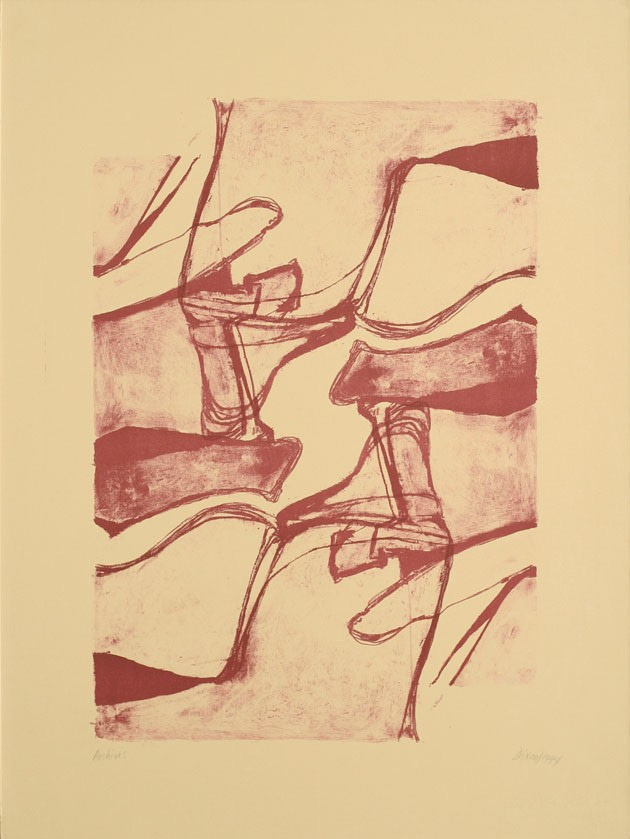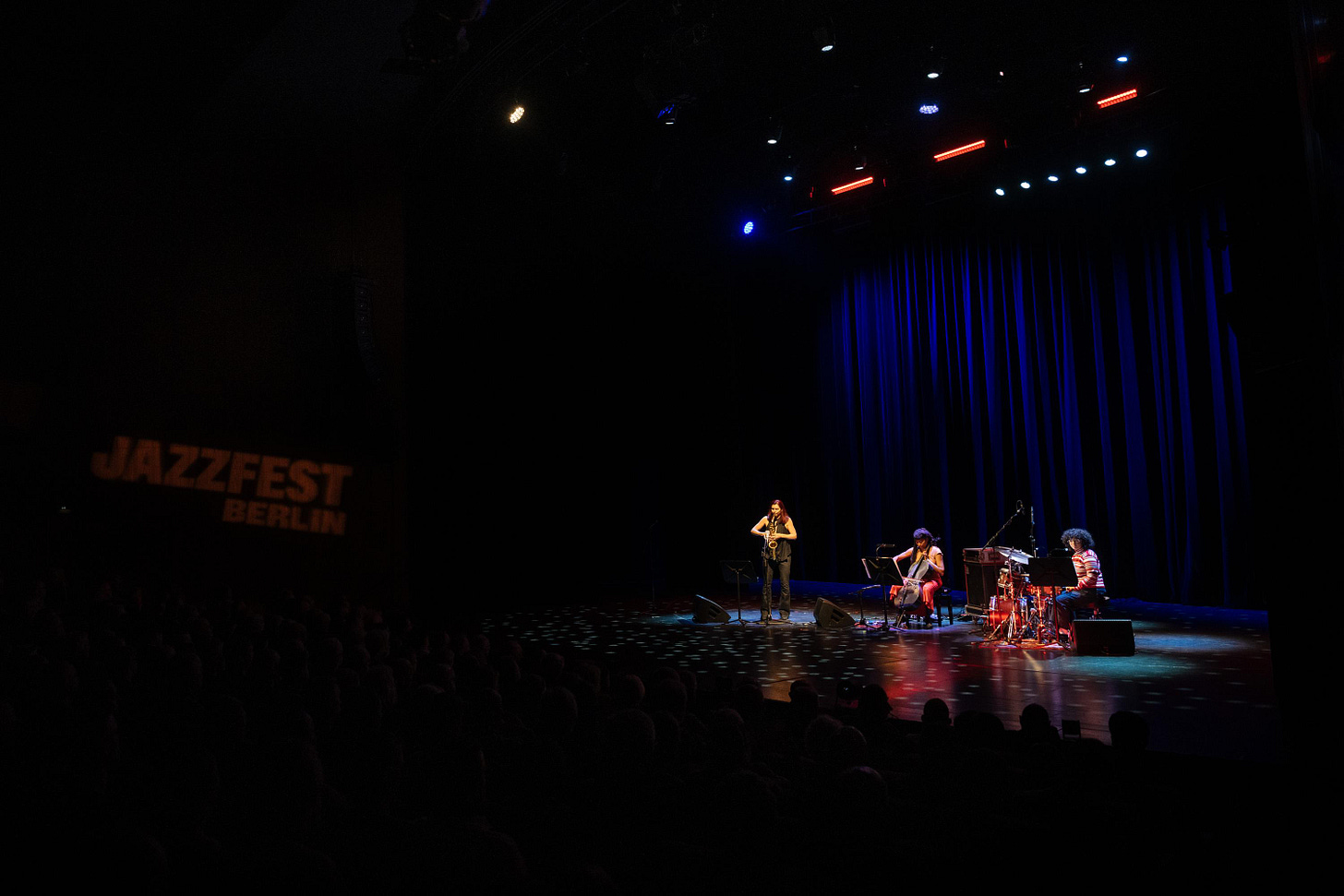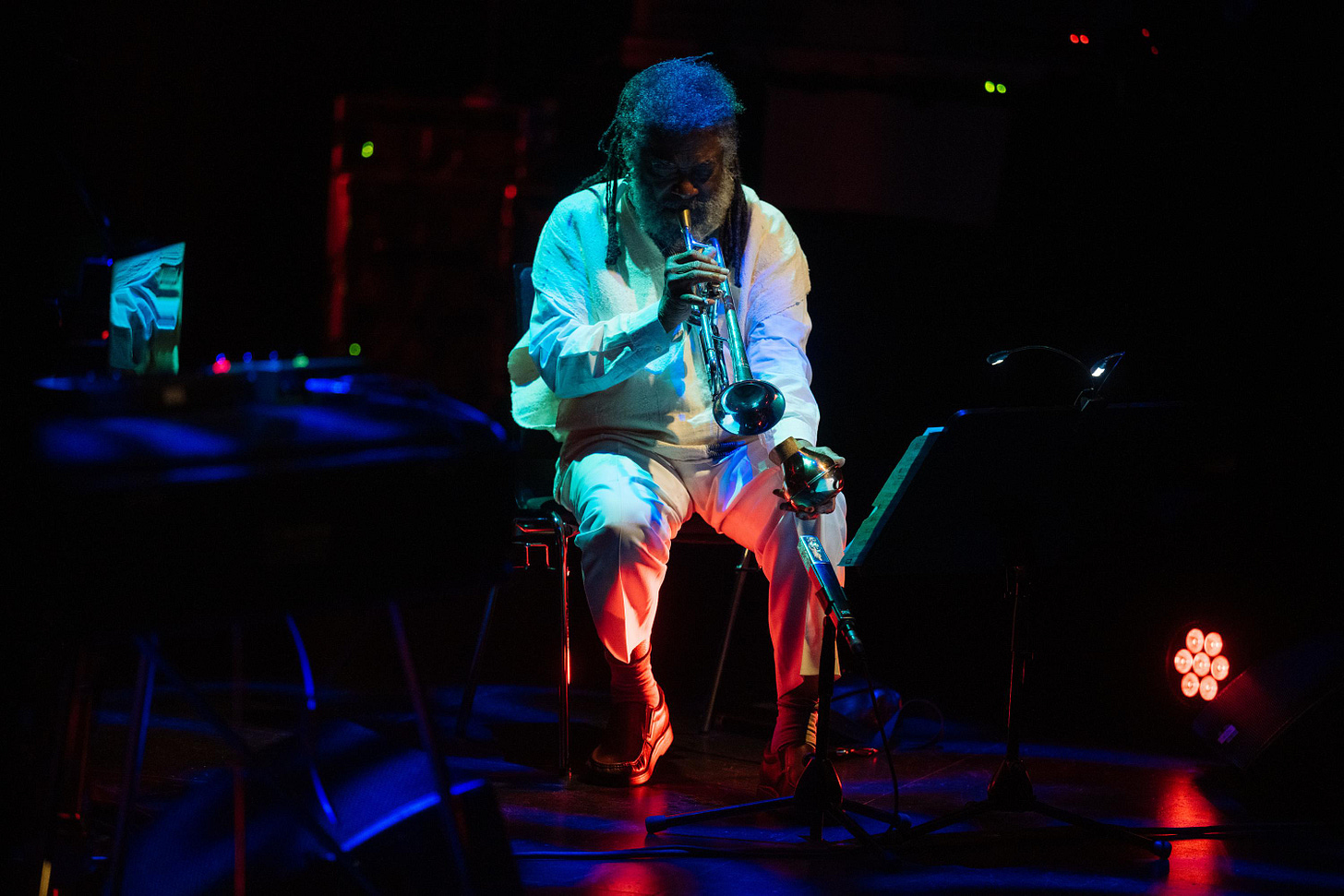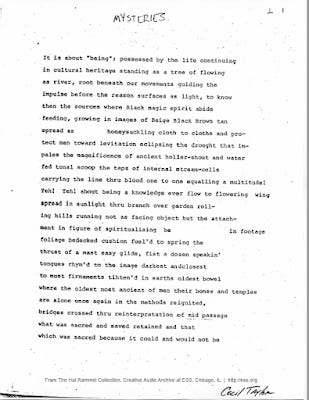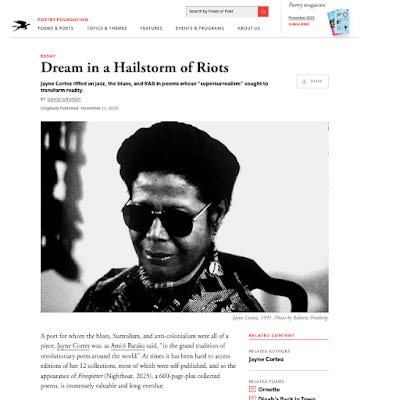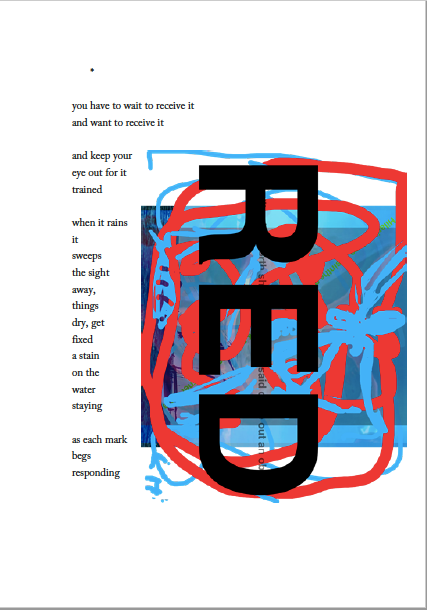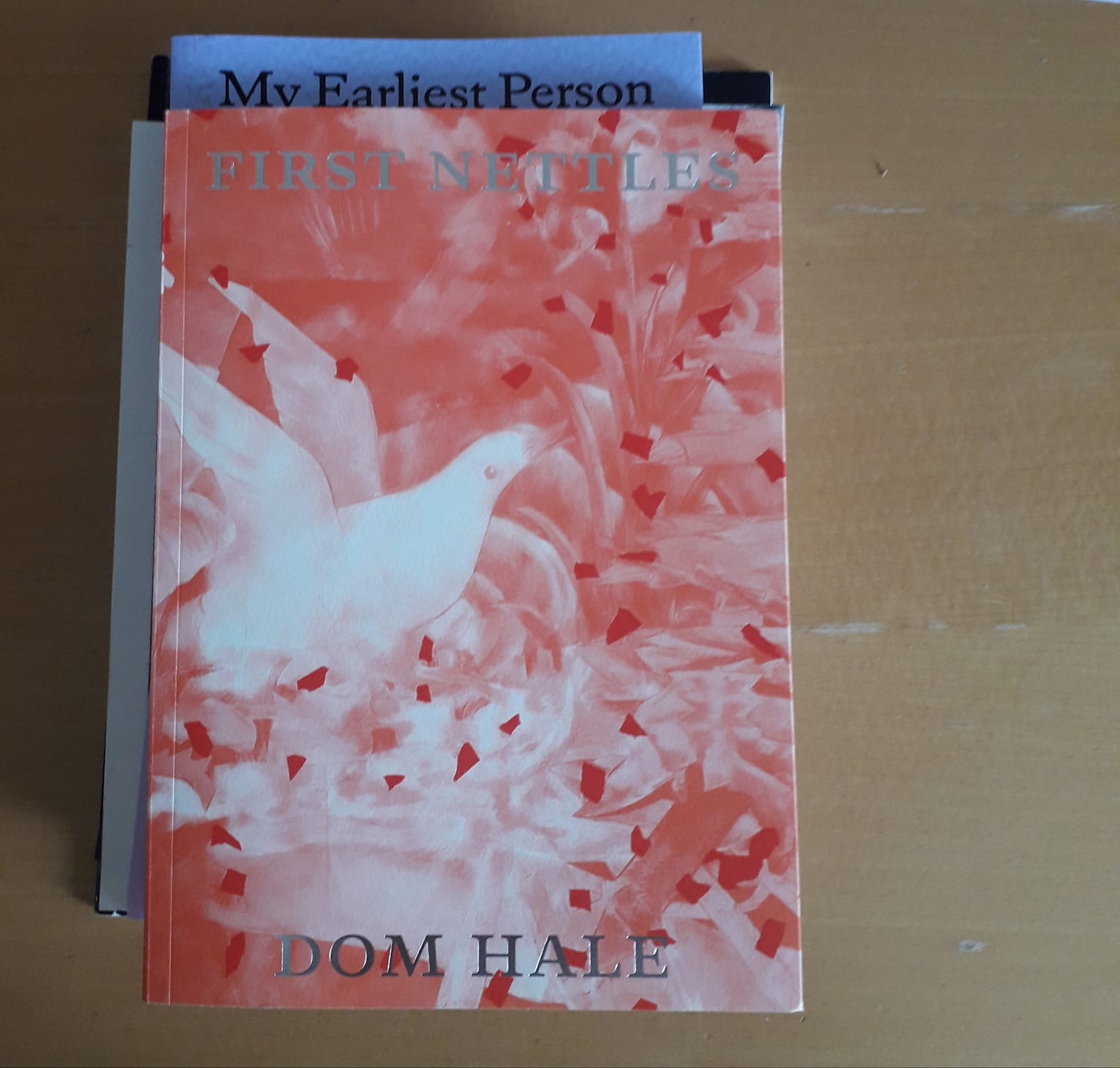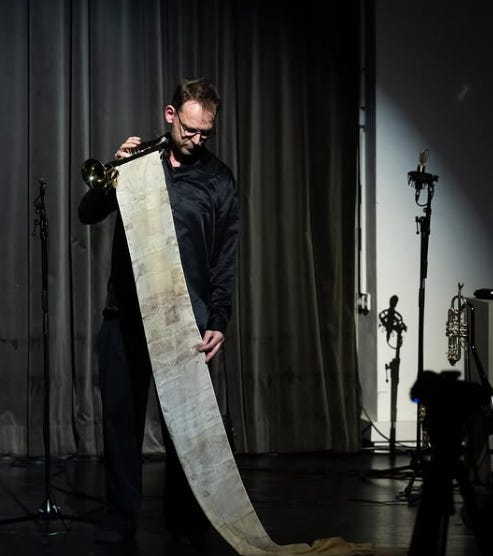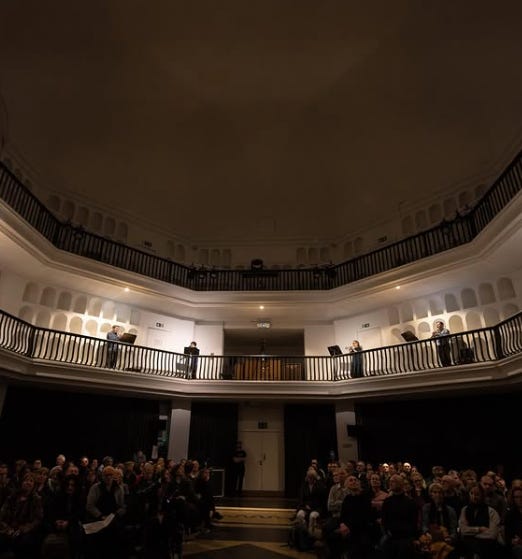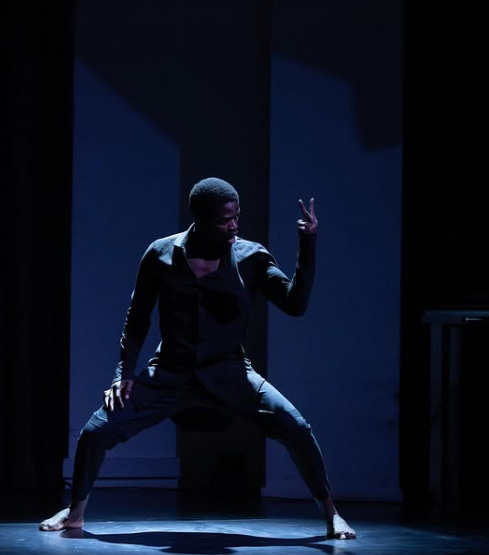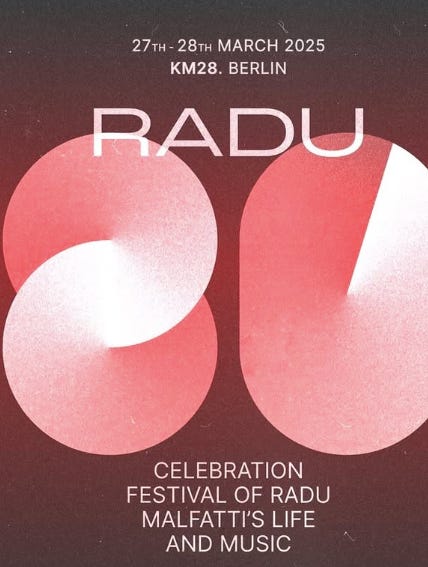[Extended cut of a much shorter review out in The Wire, split into parts for ease of reading. Part 1 is here, Part 2 here.]
Part 3: Ty Bouque, Laura Bowler, Marco Blaauw, Mazen Kerbaj, Raven Chacon
If the previous concerts by La Barbara and Pamela Z treated voice as an instrument in which ‘extended vocal technique’ means not only the extension of sound produced by acoustic meets, but through electronics and microphone work, baritone Ty Bouque’s solo acoustic set went for a different kind of expanded corporeality, sometimes barely audible in the high tower of the Silent Green Kuppelhalle (dome or copula hall). It was as demanding on the capacity for attention as Kerbaj’s set had been, but from the opposite angle: intense quiet rather than intense loudness, interruption and fragmentation rather than continuous contour.
Six of Georges Aperghis’s Quatorze Jactations—a word meaning alternately tossing to-and-fro during mental or physical illness, or a false boasting or bragging—judder between twirling nerviness and swooning slides up and down, toward or away from held notes, or a kind of breathy, shouted whisper. Speech blurs into song like a tremor, becomes agitatedly rhapsodic, gets carried away on lyrical flight, while song judders into speech, on the brink of articulation: not discourse, per se, but a constant, choppy and sometimes frantic swimming of the para-linguistic stream. This sense of convulsion, where sounds seem to get trapped in the throat even as they rise out of it, also characterizes Evan Johnson’s A general interrupter to ongoing activity. A whine turns to a gargle to a raspberry to a series of barely audible clicks, neither quite singing nor quite speaking. In a short, spoken introduction, Bouque suggests that, while Johnson’s work is sometimes seen as the failure or interruption of speech or the inability to speak, what it in fact reveals is that speech itself is a way of interrupting the natural flow of breath. In that sense, or in the sense it attains in this work, voice is precisely unnatural, queer: it “goes its own way”.
Perhaps the most compelling of the three works Bouque performs is Timothy McCormack’s Seated at the Throat, a work the composer has called a “queer blood-séance”. Breath, Bouque suggests, is “articulable” but “unpossessable”. Likewise, HIV becomes a second body growing inside one’s own: a body that isn’t yours but is impossible to get rid of, like being haunted by a spirit. If Johnson’s piece seemed to concentrate on sounds produced through exhalation—such as whistling—McCormack’s concentrates on inhalation—the open mouth taking in air to produce sound, a kind of open border between inside and outside. Pitched growls become tender moans, a kind of dulled pain or protective embrace, out of which emerges the word “passage”, vowels extended, consonants trailing along as if an afterthought. The work gets steadily quieter and quieter, at that border of sound and silence where sounds seems to cling for life: an effect eerie and somehow very moving.
The following day, against at Silent Green, singer Laura Bowler offers a set that’s less a recital and more a carefully-choreographed collection of semi-staged monodramas, in this case by Nwando Ebizie and Sivan Cohen Elias. Ebizie’s Dahlia (and you will be there forever and ever) opens with Bowler lying onstage amidst a ring of roses, live-filmed projected onto a screen above the stage. The work moves through a number of episodes: a burst of song-like melodicism, music-box-like fragments or synthesizer chords, vocal counting or wordless intonation, a brief, beat-driven section. Singing with eyes closed, Bowler gradually rises from the floor, vocal pitch ascending, intoning the names of colours, finally coming to rest. Elias’s piece Who-He-Huh sees Bowler seated at a desk, miming office typing, running through the titular phrase in tones ranging from amusement to panic, voice distorted by electronics, before playing the part of a grinning, mannequin-like figure, an “avatar health educator” who repeatedly strikes a metal plate on the back of her head with a bang—the comic violence of a Punch and Judy, the uncanniness of the possessed ventriloquist’s dummy. The various video treatments and effects seems a little unfocused, and the piece arguably lasts for longer than it should, but perhaps that’s appropriate. The work is, it seems to me, a piece about not really knowing what affect to have, a kind of non-specific anxiety particular to a certain digitized era, a certain experience of a certain generation or class, in which loss of agency is, paradoxically, dramatized through a supremely-controlled and virtuosic performance.
Another supreme virtuoso, trumpeter Marco Blaauw is particularly active over the two concerts, much of the work drawing from his ‘Global Breath’ trumpet, an attempt to gather the sounds of trumpets or trumpet-like instruments from all over the world which also forms the basis for a sound installation in the venue. The first of these sets, four works written in the last three years, concentrates on the double-bell trumpet, which allows, for instance, one bell to be muted and the other open, creating the possibilities of ever-shifting timbral combinations. Elena Rykova’s Vicissitudes layers the trumpet with plentiful delay, à la late Bill Dixon, notes burred with growled vocalising or splintering into high upper partials. Ayana Witter-Johnson’s Songs of the Abeng opens with a spoken recording explaining the history of the titular instrument, a horn used by maroon communities in Jamaica to signal the approach of slavers, using a code never divulged to outsiders. Blaauw passes a map of Jamaica, printed on cloth, round the audience, later furling it round the trumpet as a kind of flag: amidst an electronic part, live and offstage acoustic trumpets play through fragments of familiar tunes, held calls, before the recorded voice returns to urge attention to history amongst whirring, buzzing breaths, the work ending with Blaauw blowing the abeng itself as a kind of closing call to attention. George Lewis’s Buzzing, one of Lewis’s ‘Recombinant’ series for solo acoustic instruments extended by electronics, begins with the mouthpiece alone: with the rest of the horn added, Blaauw squeals up to high, tight pitches and rasping low dives, swooping open horn delay and pitch-shifting mutes. At one point, the electronics drape the trumpet in a cloud of sound as if a virtual horn section: echoes of the Ellington orchestra perhaps, or the halo of delay that surround Miles Davis on his tribute to Ellington, ‘He Loved Him Madly’, as the collective sounds through the desolation of the bereft soloist. The mood is buzzier, brighter than Davis’ lament, however: a series of lively episodes aimed to show off the trumpet’s tonal qualities to best effect. Aaron Holloway-Nahum’s I Contemplate Snippets of Silence and Find them Few adds Ty Bouque’s baritone, engaging Blaauw in a comically self-referential dialogue on the process of making sound (“The process is very intense. Is it a nice feeling? No”). Bouque alternates falsetto leaps and deep growls, grinning as Blaauw “speaks” through the horn in a virtuoso passage requiring visible straining, covers his mouth like a substitute human mute. Full of camp theatrical swagger, one might call a study in how the voice is like a trumpet and the trumpet is like a voice.
Following Laura Bowler’s performance, a further set led by Blaauw’s Global Breath moves through works by Milica Djordjević, Dai Fujikura, Liza Lim and Georg Friedrich Haas, with dramatic and compelling interventions by dancer-choreographer Edivaldo Ernesto. Djordević’s Monochrome, light blue darkness, sees eight trumpets up in the gallery, held tones passed around in a slow relay. The piece traces a regular process, daisy chain echoes across the ensemble through a range of tone colours: now muted movements introducing a rhythmic spinning to the harmonic cloud, like slowly running on the spot, how high whoops, bright and open, followed by muted effects as if the ensemble had temporarily dipped underwater. The sound is generally compelling, though at times it can feel a little too much like a run-through of techniques—perhaps a temptation for any composer working with Blaauw’s ability to seemingly play anything. Edivaldo Ernesto’s first dance intervention offers startling contrast: thumping the chest, breathing and grunting in a constant level of anguished energy that seem simultaneously directed outward and inward, like a kind of broken martial art that’s as much self-harm as self-defense.
Dai Fujikara’s new Shimmer is one of the most compelling pieces of those written for Blaauw—perhaps because, as Fujikara notes in the programme note, though he’s “a big brass fan, [...] I don’t like the typical brass sound used in classical music”, instead aiming to “make the trumpet sound sensual without giving the impression of a fanfare or some sort of powerful brass sound.” Two double-bell trumpets, four mutes, call to each other across the gallery, the notes sounding as if electronically-faded in, their edges cut into a level of piquant, perpetually wah-wah’d tremolo: a brief, trilled ballad, moves to a slow and stately melody spread across the two voices, then sounded in unison, an introverted, muted, dialogue, a slow flickering.
Liza Lim introduces Shallow Grave, written for the replica of a terracotta Neolithic horn found in a cave in Southern France. The instrument itself already supposes a level of mediation: not an animal horn—the original form of the instrument—but a replica, a ceremonial or ritual displacement whose ritual or practical function is, of course, long lost. Blaauw plays it lying down on a table on his back, holding a single, resonating noe then repeating it with added, vocalized multiphonics, the sound progressively blurred and layered, as if the human voice had possessed the horn and the horn’s voice had possessed it. The connection to the second part is not all that clear: Blaauw stands, on alto trumpet, clear calls and whoops alternating with desultory low blarts. Lim’s programme note suggests that it’s a variant on that sense of grave, possession, discovery in the first place, where “the living haunt the dead”: virtuosity as excess, perhaps, a flashiness that re- or displaces ritual function, like a kind of sardonic version of the Neolithic call.
Georg Friedrich Haas’s I can’t breathe, dedicated to Eric Garner, comes out of a Black Lives Matter moment now a dedicated in the past, with the political situation worsening and little in the way of structural change. Ernesto here performs alongside Blaauw and, truth be told, the impact of the dance upstages the music, Ernesto stomping and running in circles down the aisle and up to the stage, moving towards the audience, gazing into the middle distance, as if the urgent capacity to announce something for which no words emerge. But neither does the music ‘fill in’ or ‘speak for’ what the speechless—but by no means silent—dance enacts. The martial arts element, the link between arts of war and arts of dance—I think of Milford Graves’s yara, for instance—is again there, and again, in contrast to the affirmative stance of Graves, of a kind of brutal, self-harming kind. The dancer seems to mimic the damage done to the body by an invisible other, a glitch or a body under stress or torture, in contrast to the more subdued lamento of the music. And, in a kind of defiance of the choking of Eric Garner, breath is very much present, albeit of a flailing, panting, kind, the by-product of physical effort that turns into a kind of musical cry in itself. Ernesto now stands directly in front of an audience member in the front row, stares at them, then mimes shooting themselves in the head and falls with a crash to the floor before springing up again in a kind of grotesque, slapstick resurrection. The discomfort of this kind of visceral physicality, the insertion of the black body into the (literally) white space of the Kuppelhalle, feels precisely that it’s putting something at stake.
Down to Silent Green’s other concert venue, the underground Beton (or concrete) Halle, for the second set by Mazen Kerbaj. From One War to Another reflects on how “the memory of violence firsthand...replaced by the voyeurism of violence inflicted on others”, Kerbaj’s prior first-hand experience of conflict—the Lebanese Civil War and the later Israeli bombing of Lebanon—in the current moment, giving way to watching the horrors in Gaza on screen. Lungless concentrated its energies in a fixed space: for this piece, movement through the space gives the work a dramaturgic structure, Kerbaj beginning at the back of the hall, stopping at various points to circular-breathe a single, low note on a pocket trumpet played with a saxophone mouthpiece via an extended piece of tubing, a kind of ominous anti-fanfare. Onstage, he modifies the sound, moving the bell across two microphones, then sets up a loop and, setting the trumpet aside, proceeds to feedback blarts and whooshes from a modified version of the battery-powered crackled synth. Distorting vocal sounds from a contact mic placed inside his mouth amplify inhalation as a roaring, a ring-modulated groaning, a sudden silence pricked by high-pitched, strangled squeals set off by a brillo pad. As the synth emits a wailing SOS signal, Kerbaj pushes the table into the centra aisle down the first few rows of the audience, letting the sound play itself out as he raises the speakers to modify the sound, bringing them down onto his chest as if performing CPR, then waiting for the battery to run down to silence. Taking the applause onstage, he thanks the audience “for keeping your eyes, ears and hearts open to what’s going on in Palestine”.
Running through without breaks for applause, another set by Blaauw’s Global Breath adds percussion and wind to brass: Milica Djordjević’s TRI, a compelling trio for contrabass clarinet (Carl Rosman), trumpet (Blaauw) and percussion (Dirk Rothbrust), opens with a percussion solo, the sound of ceramic tiles rubbed with stones. Unison clarinet and trumpet melodies roll out gong-like tones from struck metal sheets, shivering into high peals. It’s a structurally measured work, full of interesting sonorities given space to breathe. Blaauw’s own Enigma is played on six conch shells distributed through the room. Beginning with quiet, breathing sounds, a gentle white noise, it builds up to the resonant calls for which the instrument is best known, rich tones swirling round the ears in spatial stereo.
Wadada Leo Smith is, of course, best known as a trumpeter, but the new piece premiered here is for solo percussion. In its instrumentation, The Celebration of Unity with the Indigenous People’s Nations Across the USA combines West African, East Asian and Euro-American elements—Gankogui and Atoke bells, Tibetan singing bowls, four giant bass drums—not for a romanticized foklorism but within its own, specific timbral vocabulary. A huge bass drum boom sets things in motion, the drums’ enormous vibrations contrasting with the comparative delicacy of the struck tuned percussion beside them. The piece moves in gestural bursts, those booms vibrating into silence, rather than setting up continuous rhythmic patterns: rhythm as much about alternating melodic and motivic material as propulsive momentum. Soprano Katrīna Paula Felsberga joins for further pieces by Liza Lim and Oscar Bianchi, the bright tones of voice and trumpet chasing each other in virtuosic trails and flurries.
By this stage I’ve pretty much reached saturation point—the two concerts on this day total six hours alone—but there’s one final set, two compositions by Raven Chacon played by Blaauw’s ensemble The Monochrome Project bookending book-ending a Chacon solo noise set. Interviewed for the journal Disclaimer last year, Chacon call his use of high-pitched sounds which “sit above everything, maybe even to the point of inaudibility” a “signalling towards urgency”: dog whistles and sine tone generators are treated with pedals which play the sound forward and backwards and at different octaves at the same time so that they “don’t quite resolve [...] The sounds arrange themselves into cycles, but they’re always offset and shifting.” This kind of tense stasis differs from the composed pieces, in which clear processes are followed and mapped out: improvisation, even if within certain defined parameters, blurs those processes at the edges, offers greater timbral and temporal ambiguity. In that sense, Chacon’s solo reflects Kerbaj’s crackle-box work, in which electronic effects which must to a certain extent be improvised, or even chance-determined—the crackle-box an instrument with a mind of its own, as when the battery runs down at the end—electronics not as backdrop or extension to instrumental prowess, but as entities in themselves, shaping musical structures to unpredictable ends.
Chacon’s compositions, by contrast, follow deceptively simple processes. What the listener sees and hears is what the piece is. In Whistle Quartet—now almost 25 years old—the ‘leader’ blows a dog-whistle in waves of breath, picked up and repeated in unison in turn by the other whistlers before the leader steps back, dramatizing, or illustrating, a process of learning through repetition and the eventual loss of the teacher.
The more recent Call for the Company, in the Morning, commissioned by hcmf in 2022, offers, largely, rhythmic variations on a single tone, taken from a handbook of fox-hunting calls. One trumpet blows the call, introducing various degrees of extended-technique variation, before a brief ‘noise’ intervention by another signals the rest of the ensemble to join, modifying the sounds in terms of speed and timbre to varying effect. The process is repeated until each of the eight trumpeters has played one solo, the final ensemble played as the musicians process to the back of the hall through the audience. In these pieces, sound is not so much an aesthetic object as a social process or problem. Sounds assoicated with a different formal context of participation in a ritual, a game, a structured social interaction are removed from that context and placed in a new, ‘purely’ formal context which sparks reflection rather than participation—in the case of the hunting calls, a kind of tempered exhilaration, tinged with menace. What does it mean to aestheticize these signals associated, in the British context, with aristocratic blood sport, signals to organized violence? Slowed down, each repeated noted comes to sound like a kind of hollow fear, a grotesquely elongated wailing, interminable, beyond meaning, a collapse into the opposite of that bloodlust, a resistance, a lament.
In place of any kind of summary or conclusion, a coda. Over at KM28 (not part of the festival), Lucio Capece had organized a two-day 80th birthday festival for Radu Malfatti with some twenty participants. In need of a change of pace after being saturated in music over at silent green, I caught the second night, the ensemble spread out throughout the room as if the sound were emerging from the audience or the walls themselves. In two ensemble pieces with varying degrees of silence, held tones merged and contrasted in a mixture of bowed strings, breath, and the irregular punctuation of performers gently tapping instruments or music stands, as if to present too much luxuriation, reminding us of structure, to pay attention to the sound and the silence as much as getting lost in it. But the highpoint came in the final set, which Malfatti played solo: a bass harmonica, a microphone and a single guitar chord repeating on tape, making the world at once disappear and pull itself into presence. “You must never blow into a microphone”, Joan La Barbara had instructed the audience at her Q&A a few days before, “you must always inhale”. (Anyone who’s ever used a mic is familiar with the grating burst of noise she had in mind.) But Malfatti found a way to do so: at first blowing through the harmonica holes, held away from his mouth, then bringing the instrument closer to the microphone so that the tone gradually came into volume and tonal presence, and finally, removing the instrument altogether and breathing at a distance to create a gentle white noise. As the guitar chord kept repeating—heartbeat, iteration, signpost—it came to seem like a study in what it means to be, and to remain alive. One could hardly ask for more.
